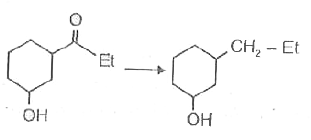Which of the following reagents would convert an aldose into corresponding aldonic acid?
Tollen's reagent
Fehling's solution
Bromine water
Red P+HI
The correct Answer is:A, B, C
To convert an aldose into its corresponding aldonic acid, we can use several reagents that facilitate this oxidation reaction. Here’s a step-by-step breakdown of the process:
Step 1: Understanding Aldoses and Aldonic Acids
- Aldoses are a type of sugar that contains an aldehyde group (-CHO). Glucose is a common example of an aldose.
- Aldonic acids are the oxidized forms of aldoses, where the aldehyde group is oxidized to a carboxylic acid group (-COOH).
Step 2: Identifying the Reagents
The question lists several reagents: Tollens' reagent, Fehling's solution, bromine water, and red phosphorus with HI. We need to determine which of these can oxidize an aldose to an aldonic acid.
Step 3: Evaluating Each Reagent
1. Tollens' Reagent (AgNO3 + NH4OH):
- Tollens' reagent is known for oxidizing aldehydes. When glucose reacts with Tollens' reagent, it gets oxidized to gluconic acid, and a characteristic silver mirror forms.
- Conclusion: Tollens' reagent can convert an aldose to an aldonic acid.
2. Fehling's Solution:
- Fehling's solution contains copper(II) ions that can oxidize aldehydes. When glucose is treated with Fehling's solution, it is oxidized to gluconic acid, producing a red precipitate of Cu2O.
- Conclusion: Fehling's solution can also convert an aldose to an aldonic acid.
3. Bromine Water:
- Bromine water is another oxidizing agent that can oxidize aldehydes. Glucose reacts with bromine water to form gluconic acid.
- Conclusion: Bromine water can convert an aldose to an aldonic acid.
4. Red Phosphorus and HI:
- Red phosphorus and HI do not oxidize aldoses; instead, they can reduce sugars or convert them into hydrocarbons.
- Conclusion: Red phosphorus and HI do not convert an aldose to an aldonic acid.
Step 4: Final Answer
Based on the evaluations:
- The reagents that can convert an aldose into the corresponding aldonic acid are Tollens' reagent, Fehling's solution, and bromine water. Therefore, the correct options are 1, 2, and 3.
Summary
The reagents that can convert an aldose into the corresponding aldonic acid are:
- Tollens' reagent
- Fehling's solution
- Bromine water
- Aldoses are a type of sugar that contains an aldehyde group (-CHO). Glucose is a common example of an aldose.
- Aldonic acids are the oxidized forms of aldoses, where the aldehyde group is oxidized to a carboxylic acid group (-COOH).
The question lists several reagents: Tollens' reagent, Fehling's solution, bromine water, and red phosphorus with HI. We need to determine which of these can oxidize an aldose to an aldonic acid.
1. Tollens' Reagent (AgNO3 + NH4OH):
- Tollens' reagent is known for oxidizing aldehydes. When glucose reacts with Tollens' reagent, it gets oxidized to gluconic acid, and a characteristic silver mirror forms.
- Conclusion: Tollens' reagent can convert an aldose to an aldonic acid.
- Fehling's solution contains copper(II) ions that can oxidize aldehydes. When glucose is treated with Fehling's solution, it is oxidized to gluconic acid, producing a red precipitate of Cu2O.
- Conclusion: Fehling's solution can also convert an aldose to an aldonic acid.
- Bromine water is another oxidizing agent that can oxidize aldehydes. Glucose reacts with bromine water to form gluconic acid.
- Conclusion: Bromine water can convert an aldose to an aldonic acid.
- Red phosphorus and HI do not oxidize aldoses; instead, they can reduce sugars or convert them into hydrocarbons.
- Conclusion: Red phosphorus and HI do not convert an aldose to an aldonic acid.
Based on the evaluations:
- The reagents that can convert an aldose into the corresponding aldonic acid are Tollens' reagent, Fehling's solution, and bromine water. Therefore, the correct options are 1, 2, and 3.
The reagents that can convert an aldose into the corresponding aldonic acid are:
- Tollens' reagent
- Fehling's solution
- Bromine water
Similar Questions
Which of the following reagent will convert glycerol to acrolein ?
View SolutionWhich among the following reagents convert alkyl halide into alkane ?
View SolutionWhich of the following reactions would give caproic acid ?
View SolutionWhich of the following reagents convert the propene to 1-propanol?
View SolutionWhich of the following reagent converts nitrobenzene to aniline?
View SolutionWhich of the following reagents convert the propene to 1-propanol?
View SolutionWhich of the following reagents can be used to convert alkyl halide into alkane ?
View Solution
Which of the following reagent would work best for the above conversion?
View SolutionWhich of the following reagent can convert propan-1-ol to propanoic acid
View SolutionThe reagents used to convert

View Solution
